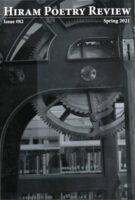
In the Editor’s Note for the Spring 2025 issue of Hiram Poetry Review, Willard Greenwood writes, “When the HPR first came into existence, we published poems by Charles Bukowski — see our first couple of issues. Since then, we have been on the lookout for outlaw poets and their various desperado philosophies in poetic form.”
Joining the ranks in the newest issue of Hiram Poetry Review are works by Fred Arroyo, Katie Berta, Neil Carpathios, Lynn Gilbert, Jake Hunter, Jeff McRae, Daniel Morris, J. Alan Nelson, Gloria Parker, Robert L. Penick, Joseph Powell, Beth Brown Preston, Gabriel Ricard, Claire Scott, JR Solonche, Jeff Tigchelaar, and many others.
Discover loads more great lit mags with our Guide to Literary Magazines, Big List of Literary Magazines, and Big List of Alternative Magazines. If you are a publication looking to be listed in our monthly roundup or featured on our blog and social media, please contact us.


